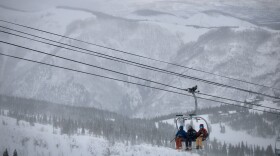-
A healthy stream of snowstorms starting in late-October helped build and maintain snowpack levels above the historic average until mid-April, when unseasonably warm weather and a lack of storms caused the snowpack to deplete and drop below normal ahead of the date when levels typically peak.
-
Each week, ������٠collects and curates some of the more important stories of the week that have aired on our daily newscast. We know how busy life can be, and that it's not always possible to get your news on our airwaves (or from streaming us right here on our website). Fill in the gaps and catch up right here. No one enjoys the feeling of missing out!
-
Drought conditions in the Rocky Mountains could further lower water levels at Lake Powell.
-
Utah is using a technology that can add more water to the state's supply. Others in the Colorado River basin are looking to expand.
-
Snowpack levels in Summit County remain above normal, outpacing the past five seasons.
-
Water experts say cloud seeding deserves more funding and research to measure its impact on the drought-stricken Colorado River basin.
-
The Colorado River starts as mountain snow, but climate change has made it harder to predict how much will flow into streams every year. A new study says springtime sun, rain and plants could make it easier.
-
New findings about sublimation explain how snow is lost to evaporation before it can melt. The data can help form better predictions about water supplies from the Colorado River.
-
A new study from University of Colorado Boulder researchers finds a strong chance that precipitation will make the next two decades on the Colorado River wetter than the last.
-
Colorado's Rocky Mountains have reached peak snowpack, but climate change is changing the way snow turns to water. States around the region are debating new rules for the river that center around new water deficits.

Play Live Radio
Next Up:
0:00
0:00
Available On Air Stations










